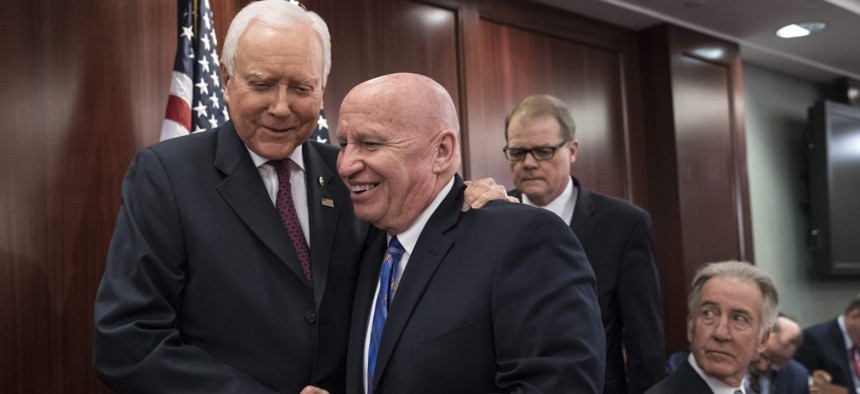GOP Tax Deal Is Slated to Expand Capped SALT Deduction Proposal

House Ways and Means Committee Chairman Kevin Brady, R-Texas, center, embraces Senate Finance Committee Chairman Orrin Hatch, R-Utah, left, on Capitol Hill in Washington, Wednesday, Dec. 13, 2017. AP Photo/J. Scott Applewhite

Connecting state and local government leaders
Property, income and sales taxes would be covered under the emerging plan, which would differ sharply from current law.
WASHINGTON — Republicans in the House and Senate were settling Wednesday on tax legislation that would include a deduction capped at $10,000 for state and local property, income, or sales taxes, according to one lawmaker familiar with negotiations.
The tentative state and local tax, or SALT, provision would expand a proposed $10,000 deduction for only property taxes written into tax bills that the House and Senate passed in recent weeks. The lawmaker who described the provision did not wish to be identified and cautioned that "nothing is closed" until a formal proposal is finished.
With the proposal the lawmaker described, taxpayers could claim a $10,000 SALT deduction in total—not $10,000 for each type of tax.
Although the latest SALT plan is broader than what is in the House and Senate bills, it would dramatically change existing law. Individual taxpayers can currently deduct state and local property taxes, as well as either income or sales taxes, on their federal returns, without a cap like the one that's now under consideration.
Senate Majority Whip John Cornyn, of Texas, is the chamber's No. 2 Republican and sits on the conference committee that is brokering the tax package. He also provided some insight Wednesday about where the committee is headed on the state and local deduction.
"I think there'll be more flexibility for people, depending on which sort of taxes they pay, whether sales or income, or property," he told reporters. In response to a follow-up question about whether the bill would definitely feature a $10,000 cap on the SALT deduction, he replied: "I believe so."
Maintaining the full SALT deduction has been a priority for state and local government groups, including those representing cities, counties and mayors, amid the GOP-led debate about how to rewrite the tax code. It now appears very likely those groups will lose that fight if Republicans pass their legislation and it is enacted into law.
Members of the conference committee had arrived Wednesday at what was being described as an agreement "in principle," on how they want the tax bill to look. Cornyn characterized it as a "framework."
The conference committee held its only public meeting Wednesday, but did not share the latest details about the emerging tax plan. House Minority Leader Nancy Pelosi called the meeting a "charade."
"They've already announced that they have concluded the terms of the agreement," the California congresswoman added.
Other Democrats echoed that view.
“What’s happening today is a sham," said Sen. Ron Wyden, of Oregon, who is the ranking member on the Senate Finance Committee. “Nobody ought to mistake this conference for real debate.”
House Ways and Means Chairman Kevin Brady, of Texas, a pivotal figure in the tax discussions that have unfolded in recent weeks, has avoided getting into specifics about how Republicans in the two chambers are planning to merge their bills.
But he said the committee is on track to release a report outlining the deal it has reached by the end of the week.
House and Senate votes on a final tax bill are anticipated early next week. Republicans want to get the legislation to President Trump's desk for his signature before Christmas.
It's now widely expected that the conference committee's plan will involve nudging corporate tax rates upwards to 21 percent, from the 20 percent level the House and Senate bills called for. And that it will push the top individual tax rate for the nation's highest earners down to 37 percent. It's now 39.6 percent under the existing tax code.
There were still a slew of unanswered questions Wednesday night about how other specific provisions that affect state and local governments might appear in the final bill. These involved exemptions for certain bonds, how public pensions are treated under the tax code, and tax credit programs that help to finance the restoration of historic buildings and investments in low-income communities.
The House bill, for example, calls for repealing an income tax exemption for interest earned from private activity bonds issued after 2017. State and local governments can issue the bonds as part of public-private partnership deals, and for nonprofits like hospitals and universities. They are also used to help finance housing.
Rep. Tom Reed, a New York Republican, voiced support for the bonds at an event on Wednesday morning. But he also suggested that the pending tax overhaul could alter how they are taxed.
"I'm very confident that you may see some reforms on private activity bonds," he said. "I think there's going to be a narrowing of the scope."
Brady, meanwhile, offered a hint of optimism for those who would like to see the bonds shielded from major changes.
"We've heard a lot of good discussion in support for private activity bonds," he said. "So that'll be part of the conference report."
Bill Lucia is a Senior Reporter for Government Executive's Route Fifty and is based in Washington, D.C.

NEXT STORY: GOP Leaders Near Deal on Tax Bill





